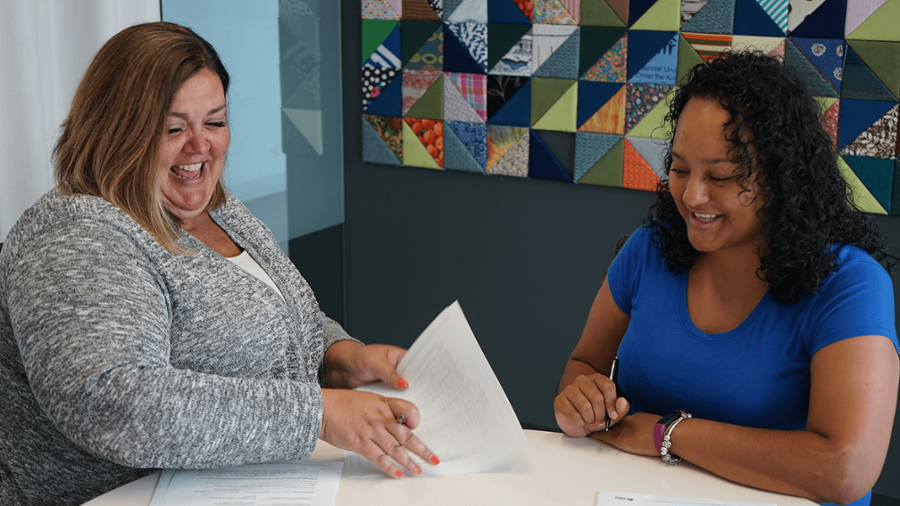Your Journey to Homeownership with Twin Cities Habitat
Dreaming of your own home with a yard, open kitchen, or a garage for your car? Twin Cities Habitat for Humanity's Homeownership Program can help turn...
3 min read
 Twin Cities Habitat for Humanity
:
12:00 PM on June 14, 2023
Twin Cities Habitat for Humanity
:
12:00 PM on June 14, 2023

Editor's note: The following information was updated in 2023 to include additional homebuyer resources.
If you’ve owned a home before, you might not consider yourself a first-time homebuyer. But if you don’t own a home anymore, you may still qualify for programs designed for first-time buyers. Don’t pass by those first-time homebuyer programs without taking a closer look! Depending on how recently you owned a home, you might actually qualify for incentives and assistance programs that say they’re only for first-time homebuyers.
"Most people don't know they qualify for these programs," says Betsy Mills, Vice President of Finance & Lending at TruePath Mortgage by TCHFH Lending, Inc., because they don't know the most commonly accepted first-time homebuyer definition. In fact, depending on which program you choose, you might be eligible for a first-time homebuyer loan even if you've previously owned a home.
According to the U.S. Department of Housing and Urban Development (HUD)'s definition of a first-time homebuyer, even people who've owned a home in the past may be eligible for first-time homebuying assistance. They define a first-time homebuyer as any of the following:
"An individual who has had no ownership in a principal residence for a period of three years as of the date they purchase the new property. This includes a spouse (if either meets the above test, they are considered first-time homebuyers)."
Essentially, if you haven't owned a home in the past three years, you may be eligible for first-time homebuyer assistance. Even if one spouse owned a home more recently, you're both considered first-time homebuyers.
"A single parent who has only owned a home with a former spouse while married."
If you're a single parent who's owned a home recently, but only with your ex-spouse, you could meet the definition of a first-time homebuyer.
"An individual who is a displaced homemaker and has only owned with a spouse."
For example, if you provided unpaid household services to family members for several years and only owned your own home with a spouse.
"An individual who has only owned a principal residence not permanently affixed to a permanent foundation in accordance with applicable regulations."
This can mean you owned a mobile home or another residence that didn't have a permanent foundation.
"An individual who has only owned a property that was not in compliance with state, local, or model building codes and which cannot be brought into compliance for less than the cost of constructing a permanent structure."
If you owned property that couldn't be brought up to code for less than the cost of building a permanent structure on it, you might be considered a first-time homebuyer.
If that all seems a bit tough to understand, don't worry–Betsy says the official definition "isn't written in a way that's incredibly easy to understand," so many homebuyers assume they don't qualify based only on the fact that they've owned a home in the past.
In simpler terms, Betsy says HUD's first-time homebuyer definition is designed to make loans, incentives, and financial assistance available to "those who have experienced foreclosure, single parents or stay-at-home partners who only owned a home with a previous spouse, those who only owned a manufactured home, and those who have only owned property that is not a livable principal residence."
Before you count yourself ineligible for first-time homebuyer loans, you should know that not every lender offers the same assistance to everyone who meets HUD's definition.
"Every individual resource has to decide whether they follow the HUD definition or their own definition," Betsy says. Some banks and lenders might not be familiar with it, while others may purposely design their loan programs differently. Whatever the reason, Betsy says, "When looking at a first-time homebuyer resource, it's always good to inquire about how they define a 'first-time homebuyer' to see if you meet the requirements."
Betsy says that TruePath Mortgage, which is offered through TCFHF Lending, Inc., applies the HUD definition of a first-time homebuyer "to the letter" when assessing loan applications, making it a point to understand each buyer's unique situation and determine their loan eligibility from there.
"We want to understand your story," Betsy adds. "What in your background makes you question whether you’re a first-time homeowner?" For example: Did you own a home with your spouse, but now you're divorced? Did you inherit land that wasn't used for a home? Did you own a home within the last three years? All of these questions can help determine your eligibility for a first-time home loan.
TruePath Mortgage provided through TCHFH Lending, Inc.'s home loan offering includes many benefits that can make buying a home within reach, opening the door to begin building generational wealth. When you access a TruePath mortgage, you have no down payment, more flexibility with credit score requirements, homebuyer education, financial assistance, financial coaching, closing cost grants, and more. If you’re questioning whether or not you’re eligible, here’s a quick look at our process.
For information on more homebuying resources in Minnesota, visit the Minnesota Homeownership Center's website.
Your gift unlocks bright futures! Donate now to create, preserve, and promote affordable homeownership in the Twin Cities.

Dreaming of your own home with a yard, open kitchen, or a garage for your car? Twin Cities Habitat for Humanity's Homeownership Program can help turn...

Jen LaCroix, Open Market Lending Manager, and Steve Stinson, Junior Community Loan Officer, recently sat down with John Mazzara of RE/MAX Results to...

There’s a first time for everything. Buying your first home is exciting—but it can also be overwhelming.